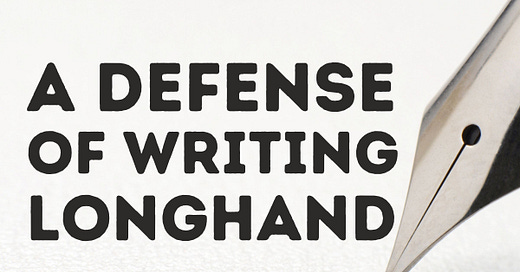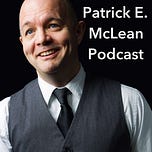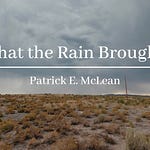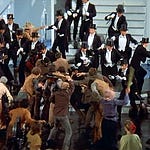I wrote this essay 12 years ago. And there are a lot of things that I used to believe that I don’t believe anymore. But the substance of this essay has become more and more true for me with each passing year. Longhand has become the most productive way for me to write. And in the increasing noise and hysteria of our digital age, it has become, for me, a blessing.
Once again I find myself about 50,000 words into a substantial work. And now more than ever, I feel that my best drafts are written with a pen and paper. So here it is again, my Defense of Writing Longhand.
I like technology. A lot. But I'm not too sure how technology feels about me. It may be my faithful friend and boon companion — then again, it may just be pretending to be my friend so it can date my sister. Especially when it comes to writing.
I'm writing a book. And for all the romance and immensity that phrase can contain, writing a book is also simply a production process. I am in the process of assembling 75,000 to 100,000 words. And, after writing 50,000 of them, I've become convinced that the first draft is the hardest part. Hemingway famously said that the first draft of everything is shit. For what it's worth, I agree. So, my question, becomes: What's the easiest way to get through the hardest part.
And to my surprise, the easiest way turns out to be writing longhand. Not printing, mind you, but composing with a long, flowing, and delightfully irregular script that fills the page like a river of words. I sit down with a pen and a piece of paper and a thousand words roll out in a flash. And not only does it often take less time than typing, I think I write better longhand.
Now realize, I am not a hunt and peck typist. I type very fast. And when I type on one of those thin little laptop keyboards that have about 3 millimeters of travel, my typing speed approaches the absurd—like Glenn Gould, the wonderfully talented and eccentric pianist who remanufactured his piano, shortening the action on his keys so that he could play Bach faster. Beautiful, yet a little insane.
But there is obviously more to writing than typing. What I'm really doing is composing. Composition requires focus. It is, like most acts of creation, monotasking. And as much as I love technology, it drives us to distraction.
A pen and paper has but one functionality. It captures the marks I make so that they can be referred to at a later time. It doesn't ring, it doesn't bother me with an incoming chat or IM. It never asks me to plug it in so it can get more power. It doesn't crash, it never needs an upgrade, and it is unlikely that someone will snatch my pad and bolt from a coffee shop with it when I turn my back.
Sure paper is perishable. But it is predictably perishable. Data turns to noise in all kinds of unpredictable ways. Like hard drive crashes. And if an IT person tells you that there is a way to archive a digital file, not touch it for 500 years, and guarantee that it will remain usable—that person is lying to you. If you think I'm wrong, I'll email you some WordStar and AppleWorks documents just as soon as I can figure out how to get them off my five and a quarter inch floppies.
But I can go the National Archives right now and read a copy of the Magna Carta that was handwritten 793 years ago. No format or version issues here. (It's fitting for this essay that Magna Carta literally means "Great Paper".)
But, to paraphrase Emerson, all of this is small account compared to what lies within us. And that is the struggle to organize and communicate our thoughts clearly with the beautiful, yet horribly imprecise instrument of language. And it is in this struggle, I believe, that the beauty and power of writing longhand is discovered.
In a way, the problem with writing is the same problem of hitting a golf ball. Both the page and the ball just sit there. And when you write you have (theoretically) a lifetime to rewrite it until you get it right.
But all that time is simply a field day for the critical part of your brain. Just the time it needs to jump in and muck everything up. This part of the brain needs something to criticize. After all, that's its job. But the critical function is not creative. Be critical about anything. No matter how absurd you are being, you will find ammo to support you. Try running Hamlet through a Microsoft Grammar check. Try running Hamlet and leaving all the scenes in.
The point is, there's no possible way to get it right if you don't first get it down. And as much as I know this—I mean know it in my bones, as a carpenter knows his measuring tape—it still doesn't help.The critical part of my brain is telling me, right now, that this sentence is horrible. That the entire device of anthropomorphizing the critcal side of my nature in this essay is a bad idea. And that I just misspelled critical. And I shouldn't have started two sentences in a row with "and".
But when I write longhand, the experience is different. I think it is because that critical part of my brain is busy picking apart my handwriting (which truly is horrible) instead of my prose. It tells me that my handwriting is atrocious. And it gets the satisfaction of being right. But who cares? While it's busy with that, the words are just rushing out. And they're not henpecked or second-guessed before they've had time to cool. They exist in a flawed, but pure state. This kind of prose has a feral power that seems to be lacking from the things I type. Maybe that's not it; maybe it's just harder to get my head in that effortless writing space when I use a keyboard. But whatever the case is, writing longhand makes it easier for me to reach a writer's high.
And if you're still not sold on the idea that writing longhand might help you write better, consider this: Until the 20th century, books were written by hand. I would argue that the best writing in history was composed by hand. The entire process is much easier now. But, would you like to argue that the increase in the power of our technology has led to a corresponding increase in the quality of our writing? Not me. I'm too busy scribing away.













Share this post